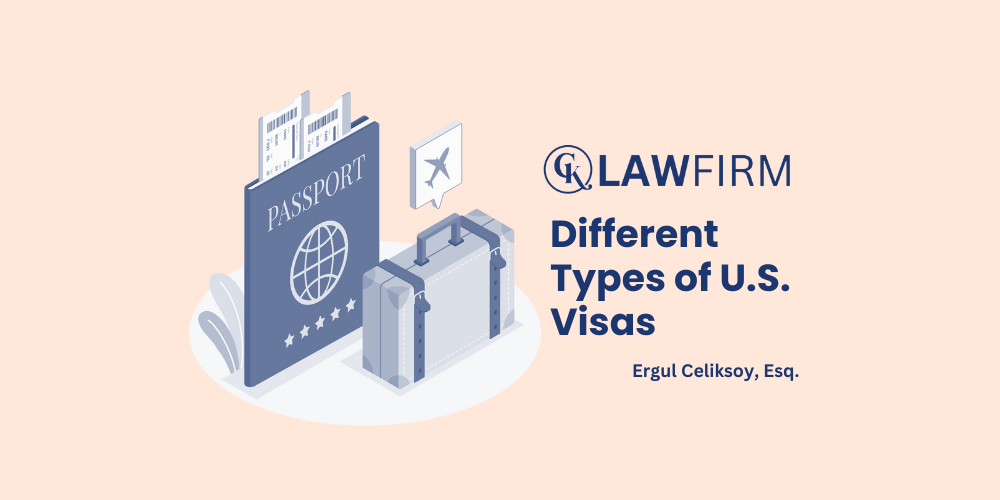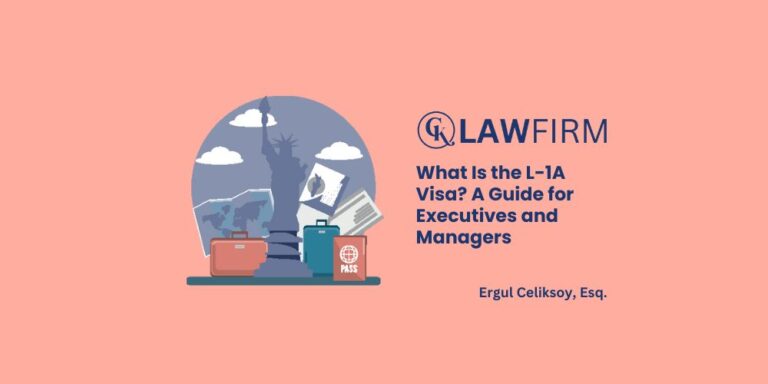Schedule an Appointment with Our Attorneys Now

Understanding the Different Types of U.S. Visas
Understanding the Different Types of U.S. Visas: Learn about visa categories, eligibility criteria, and application processes today.
By Ergul Celiksoy, Immigration Attorney at CK Law Firm
Navigating the U.S. immigration system can be complex, especially when trying to understand the various types of visas available. Whether you are planning to visit, work, study, or live permanently in the United States, knowing which visa you need is crucial. This guide will help you understand the different types of U.S. visas, their eligibility requirements, and the application processes.
Immigrant Visas
1. Family-Sponsored Visas
- Immediate Relative Immigrant Visas (IR): Available for spouses, unmarried children under 21, and parents of U.S. citizens.
- Family Preference Immigrant Visas (F): For more distant family relationships with a U.S. citizen or specific family relationships with a lawful permanent resident.
2. Employment-Based Visas
- EB-1: For individuals with extraordinary abilities, outstanding professors and researchers, and multinational executives.
- EB-2: For professionals with advanced degrees or exceptional abilities.
- EB-3: For skilled workers, professionals, and other workers.
- EB-4: For special immigrants, including religious workers and U.S. government employees.
- EB-5: For immigrant investors in new commercial enterprises.
3. Diversity Visa Lottery (DV)
- Annually provides up to 50,000 visas to individuals from countries with low rates of immigration to the U.S.
Non-Immigrant Visas
1. Visitor Visas
- B-1: For business visitors.
- B-2: For tourists, medical treatment, and visiting family or friends.
2. Work Visas
- H-1B: For specialty occupations requiring highly specialized knowledge.
- H-2A: For temporary agricultural workers.
- H-2B: For temporary non-agricultural workers.
- L-1: For intra-company transferees.
- O-1: For individuals with extraordinary ability or achievement.
- P-1: For internationally recognized athletes or entertainers.
3. Student Visas
- F-1: For academic students.
- M-1: For vocational or non-academic students.
- J-1: For exchange visitors participating in programs promoting cultural exchange.
4. Temporary Protected Status (TPS) and Other Humanitarian Visas
- TPS: For individuals from countries experiencing ongoing armed conflict, environmental disasters, or other extraordinary conditions.
- U Visa: For victims of certain crimes who assist law enforcement.
- T Visa: For victims of human trafficking.
Special Categories
1. Fiancé(e) Visas
- K-1: For fiancés of U.S. citizens.
- K-2/K-4: For children of K-1/K-3 visa holders.
2. Religious Worker Visas
- R-1: For temporary religious workers.
3. Cultural Exchange Visas
- Q-1: For participants in international cultural exchange programs.
Conclusion
Understanding the different types of U.S. visas and their requirements is essential for a smooth immigration process. Each visa category has specific criteria and application procedures. At CK Law Firm, we are dedicated to helping you navigate this complex system and achieve your immigration goals. Contact us today for personalized legal assistance and expert guidance.





